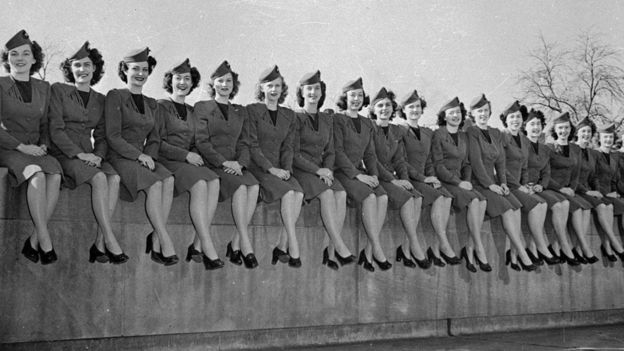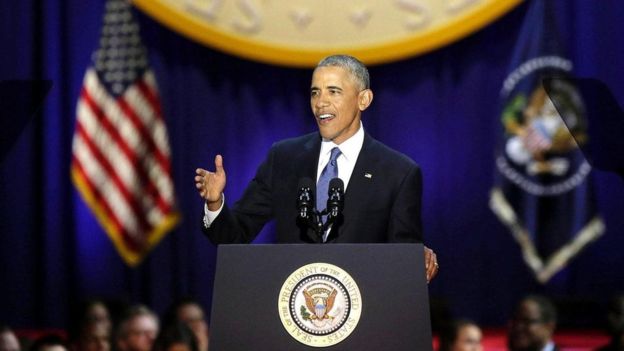职场语言中隐含的性别歧视
来源:BBC Learning English 作者:马克·皮特斯(Mark Peters) 更新:2023年5月7日

用"甜心"或"宝贝"来称呼女性是一种非常粗鲁的行为,好在这种做法早已像石洞壁画一样淡出现代社会的视野。在职场生活中,某些带有性别歧视意味的语言也早已不被接受。
但有很多证据、轶事和科学表明,带有性别色彩的语言和态度在很多工作场所仍然很普遍。在绩效评估方面,女性往往会收到模糊不清的反馈(例如,"你今年表现很好")或者包含性别歧视意味的言语,例如针对沟通风格展开过多的评论。相比而言,男性则能在与真实的工作表现有关的具体技能上获得更加明确的反馈。男性和女性之间的不平等待遇在电子邮件中表现得更加明显。即便是一些看似无害的语言也会包含性别观念,像"two guys in a garage"(车库里的两个家伙)这样的话就下意识地传递出关于属于某个地方的那些人的特点。

有很多证据表明,性别观念在职场里仍然存在,其中也包括语言(图片来源:Alamy)
要把语言与性别隔离开来并非易事,因为二者长期以来都存在复杂的关系。它们在很多方面相互交融,有的显而易见,有的则微妙难辨。
挥之不去的刻板印象
很多措辞都存在客观的性别化意味,就像Facebook高管德布?刘(Deb Liu)开始在职场上收集的那些词汇一样。有的是传统说法,就像gentleman's agreement(君子协定),虽然是从20世纪20年代才开始出现的一种表达方式,但似乎让人感觉历史更加悠久。有的跟体育有关,例如man-on-man defence(人盯人防守)和四分卫(quarterback)。还有的像是20世纪40年代的一支超级英雄团队:wingman(边锋)、strawman(稻草人)、middleman(中间人)、right-hand man(得力助手)和poster boy(海报男孩)。而德布·刘注意到的很多女性词汇都有负面含义。无论男女,没有人愿意被人称作prima donna(爱慕虚荣的人)、drama queen(喜欢小题大做的人)、mean girl(坏女孩)、Debbie Downer(说丧气话的人)或Negative Nancy(怨妇),尽管这些词都押了头韵。
其他的措辞和表述并没有特指某一性别,但却仍然融合了一些像僵尸一样永远不会消失的刻板印象。例如,克莱曼性别研究学院(Clayman Institute for Gender Research)的研究人员调查了代理型(agentic)和公共型(communal)这两种谈论领导能力的方式,它们都融合到招聘广告和绩效评估等职场内容的方方面面。

尽管 stewardess(女服务员)等包含性别标签的词汇逐渐遭人弃用,但一些词汇仍然被人使用(图片来源:Getty Images)
公共型语言主要用于女性,很容易让人联想到女性的传统特点,例如被人支持、展现热情、帮助团队。代理型语言主要用于男性,更多地是关于工作完成、肩负责任、保持独立。
克莱曼助理研究员乔安妮·维纳(JoAnne Wehner)把代理模式称作"我的语言",把共同行动称作"我们的语言"。即便很多男性和女性并不适合这些刻板印象,但这些性别框架还是会像箱子一样在工作中把人们围在其中,女性尤其如此。类似地,来自体育、战争、机械领域那些以男性为中心的术语也强化了一种观念,即职场是(或应该是)男性的专属领地。

有些词汇——例如guy——有很多层并不那么明确的意思(图片来源:Getty Images)
一层又一层
有的词就像洋葱一样拥有一层又一层的含义,就连词源学家都会被它们搞哭。guy就是这种不合逻辑的微妙语言进化过程中的典型例子,同时也深刻反映了性别观念。作为guy的复数形式,guys往往同时指代男性和女性,但单数形式几乎总是指代男性。"two guys in a garage"已经被普遍用于代指创业公司,但根据不同人的解读,这既可以指两个男人,也可以指两个人。这么说,guy(或guys)可以用在职场上了?事实上,更稳妥的替代词是folks,美国前总统巴拉克·奥巴马(Barack Obama)就经常使用这个词。

巴拉克·奥巴马经常使用"folks"指代一群人(图片来源:Getty Images)
如今,带有性别色彩的语言虽然远称不上无害,但与之前常见的用于描述女性的词汇相比,仍然实现了巨大进步。hostess(女主人)、stewardess(女管家)和 waitress(女服务员)这样的词虽然老套,但却仍在使用。虽然与之类似的词汇还有好几十个,但如今却几乎无人使用。曾几何时,写书的女性被称作authoress(女作家),这个词最早出现于15世纪。在18世纪,女杀手被称作assassinatress。还有很多与之采用相同构词方法的可笑词汇,例如cousiness(表姐妹、堂姐妹)、fornicatress(女通奸者)、greengroceress(女菜贩)、inventress(女发明家)、murdermongress(专门写凶杀故事的女作家)、pythoness(女巫)和revengeress(女复仇者)。语言真是个奇怪的东西。
还有一股类似的趋势则会将lady放在单词前面。《牛津英语词典》给出的例子包括lady-nurse(女护士)、lady-housekeeper(女管家)和lady-cook(女厨师)。1929年,DH·劳伦斯(DH Lawrence)在一段侮辱性的性别歧视内容中使用了两个类似的词汇:"只有当你像女店员(shop-lady)或女秘书(lady-secretary)那样略感自卑时,才会看起来卓尔不群。"
当然,如果回望 authoress、inventress 或 greengroceress 这样的词,也会意识到我们取得的巨大进步。但未来,当人们回顾 poster boy 和 two guys in a garage 时,或许也会认为他们取得了巨大进步。我们总能做得更好。对吧,folks?
The hidden sexism in workplace language
Neanderthalic behaviour such as calling a woman “honey” or “baby” is as out of fashion as cave paintings. Particularly in the workplace, certain kinds of sexist language are simply no longer accepted.
There’s mounting evidence that gender-propelled language is still common in many places of employment
But there’s mounting evidence, anecdotal and scientific, that gender-propelled language and attitudes are still common in many places of employment. Gendered words are thrown around constantly. In performance reviews, women tend to receive feedback that’s vague (“you had a great year” for example) or sexist, such as a disproportionate amount of comments on communication style, while men get clearer feedback about specific skills related to actual job performance. The disparity in how men and women are addressed can be even worse in emails. Even phrases as seemingly harmless as “two guys in a garage” can carry a gendered point of view, sending subliminal messages about who belongs somewhere.
Disentangling language and gender isn’t easy, since the two have a long-term relationship that is complicated. The two intermingle in so many ways, some obvious and some more subtle.
Lingering stereotypes
Many terms are objectively gendered, like the ones Deb Liu, a Facebook executive, started collecting at work. Some are old-fashioned, like a gentleman’s agreement, an expression that’s been around since the 1920s, but feels even older. Some are sports-related, like man-on-man defence and quarterback. Others sound like a team of 1940s superheroes: wingman, strawman, middleman, right-hand man, and poster boy. Many female terms noted by Liu are negative. No one, male or female, wants to be called a prima donna, drama queen, mean girl, Debbie Downer, or Negative Nancy, despite the appeal of alliteration.
Communal language is mainly applied to women, and it invokes stereotypical female traits like being supportive, showing warmth, and helping the team
Other terms and expressions aren’t specifically gendered, but they play into gender stereotypes that, zombie-like, just won’t die. For instance, researchers at the Clayman Institute for Gender Research have examined two ways of talking about leadership that infuse many aspects of the workplace, from job ads to performance reviews: agentic and communal.
Communal language is mainly applied to women, and it invokes stereotypical female traits like being supportive, showing warmth, and helping the team. Agentic language is mainly applied to men and is more about getting the job done, taking charge, and being independent.
JoAnne Wehner, a research associate at Clayman, calls the agentic mode “the language of I” and the communal move “the language of we”. Even though many men and women don’t fit these stereotypes, these gendered frames can feel like a box around people at work, especially women. Similarly, male-centric lingo derived from sports, war, and machinery (like the insufferable cliché “drill down”) also reinforce the idea that the workplace is (or should be) a man cave with water coolers.
Layers and layers
Some words have onion-like layers of meaning that could make an etymologist cry. Guy is a prime example of the tricky, illogical evolution of language and how it reflects gender. The plural form guys is often used to mean men and women, though the singular form is almost always male. “Two guys in a garage” is commonly used as shorthand for a start-up, but this could suggest two men or two people, depending on your interpretation. So is guy (or guys) OK for the workplace? A safer alternative might be folks, a word often used by Barack Obama.
Today’s gendered language, though far from harmless, is a quantum leap from some formerly common ways of describing women. Words such as hostess, stewardess, and waitress are still around, though passé, but they have dozens of sister words that sound bonkers today. A woman who wrote a book was once called an authoress, a term first found in the 1400s. In the 1800s, a female assassin could be called an assassinatress. Similarly preposterous—but real—words include cousiness, fornicatress, greengroceress, inventress, murdermongress, pythoness, and revengeress. Language is strange.
Imagine today referring to a ‘lady-executive’ or ‘lady-soldier’: you’d have to be a ‘gentleman-idiot’
A similar trend put lady at the front of words. The Oxford English Dictionary notes examples including lady-nurse, lady-housekeeper, and lady-cook. An insulting, sexist sentence by DH Lawrence in 1929 uses two such terms: “You only look so distinguished and superior, when really you are slightly inferior, like a shop-lady or a lady-secretary.” Imagine today referring to a lady-executive or lady-soldier: you’d have to be a gentleman-idiot.
Of course, we can look back on words like authoress, inventress or greengroceress and feel like we’ve made a lot of progress. But in the future, people may look back at poster boy and two guys in a garage and think they’ve made a lot of progress. We can always do better. Right, folks?